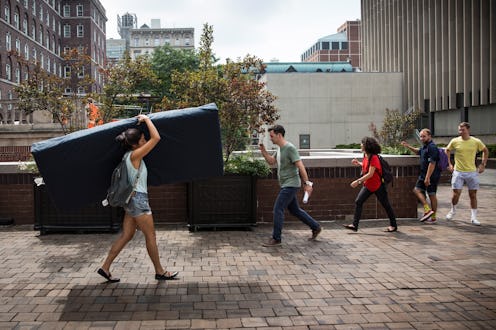With awareness spreading about the epidemic of sexual assault on college campuses, many universities are stepping up their rape prevention efforts. But one of the many obstacles still stopping them from providing the resources students need is price. University of Oregon professor Jennifer Freyd and the rest of the Administrator Researcher Campus Climate Consortium (ARC3) set out to provide an alternative to expensive climate surveys, which obtain feedback from students on sexual assault on their campuses and how the university is handling them, by creating a free one.
Freyd got together with 22 other college faculty and administrators, including top sexual assault researchers, to create the survey. It's currently in use on four U.S. campuses; soon, it will be released online for any college to use. ARC3 will also release some of the most important campus sexual assault studies on its website.
"I don't think people should be making businesses out of responding to college sexual assault and getting rich off it," she told The Huffington Post. "It strikes me as very dangerous — as soon as you have a profit motive in there, it's risked to corrupting. You should not get rich over people getting raped."
An episode of NPR's All Things Considered last month examined the rapidly growing business of college sexual assault prevention. "Corporations know that these administrators are panicking... and shopping," said Sharyn Potter, a researcher at University of New Hampshire — which sells a prevention program called Bringing in the Bystander — on the show. And Rob Buelow, a developer at online alcohol awareness program EverFi, said that about 600 schools are paying $10,000 to $20,000 per year for it.
Beyond educational programs, Freyd told The Huffington Post that consultants are often payed in the ballpark of $50,000 to help administrations handle sexual assaults. And climate surveys themselves often come with a steep charge: One by the Association of American Universities cost $80,000. While the problem is worth investing in, Freyd is concerned about the principal of making rape prevention a business. According to a feature on BuzzFeed, students have complained that Title IX consultants prioritize their own salaries over those they are hired to help. This problem gets to the heart of the issue of paying for prevention: The desire to profit can trump students' needs. In addition, the high cost of sexual assault prevention could make fewer services accessible to fewer schools.
Sexual assault climate surveys provide a way to get more accurate statistics about a crime that is underreported, and ARC3's survey has already shown promise on this front. The University of Oregon's results, just released, demonstrated that rape was more prevalent among undergraduates, while harassment was more common for graduate students. Disturbingly, 38 percent of women graduate students had experienced sexual harassment or sexist comments at the hands of a faculty member. The good news is that Freyd presented the survey's findings to the university's president, who plans to make changes to the school's policies as a result. Hopefully, a more accessible survey can lead to more changes on more campuses in the future.
Image: Giphy
